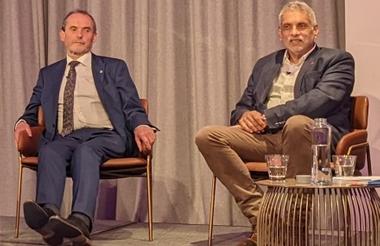The way the press reports on charities’ accounts is flawed and not representative of their effectiveness, delegates heard at Charity Finance Group’s (CFG) annual conference.
Speaking at a panel session on the future of financial reporting last week, Pesh Framjee, partner and head of not for profits at Crowe UK, also argued that the Charity Commission “perpetuates a myth” that charities should be judged by how much they spend directly on their cause.
Framjee said that charities should focus instead on “what really matters” when evaluating their effectiveness and that the sector needs to educate the media to inform better financial reporting.
He argued that the financial reporting standards were designed for commercial companies rather than charities, making it difficult for the latter to interpret them.
Also speaking on the panel, Richard Bray, finance, regulatory and taxes manager at Cancer Research UK, said that charities and auditors have a tick-box mindset and need to break away from this culture when they do their accounts.
‘Flawed measures’
Simon Hopkins from Versus Arthritis told the conference that in recent years charity accounts have often been used and compared to create “a crude narrative” around things such as expenses and ratios.
He then asked the panel how charities can use financial reporting to better inform the public about typology and different charity business models.
Framjee answered: “The press and others use very flawed measures of judging a charity’s effectiveness. How many pounds in the pence and how many pence in the pound? I think we really need to focus on what really matters. Does it really matter whether you spent 20p or 25p? Of course, it’s more the outcome.
“I think we in the sector are guilty because we perpetuate the myth that you can judge a charity’s effectiveness by how much we spend directly on our charitable services or not and what that means.
“The Charity Commission is also guilty of perpetuating that myth because in some of its surveys when it asks a question to members of the public, ‘do you want to know how many pence in the pound goes?’ or ‘how your money is spent?’, of course they’re going to say ‘yes’. Because that’s the question you’re asking which you’re expecting that answer from. It’s about making sure that we educate and educate ourselves to tell the story.”
‘Tick-box’ culture to accounting
Discussing how to cut the clutter in financial reporting and whether accounts have too much information, Bray argued that the tick-bock approach to account reporting remains a challenge.
He said: “Because we’re living in a world where auditors are subject to such stringent requirements, if you’ve got an auditor they’re likely to think ‘should this be included or shouldn’t it?’ And they’ll think ‘well, it’s much safer for me if I insist on this disclosure’.
“We live in a world where there’s such a tick-box mentality to what’s put in a set of accounts. A lot of your auditors will be going through a checklist. It isn’t whether this information is meaningful but does it tick the box. I would encourage charities sometimes to push back on what happens and also end the split. We need to get out of that mentality because we create our own clutter as well.”
Standards are ill-suited for charities
Framjee, who has been on the statement of recommended practice (SORP) Committee for over 20 years, also said that financial reporting standards are ill-suited for charities.
“Financial reporting standards, which are based on International Financial Reporting Standards, were structured, defined and shaped for for-profit entities,” he said. “They’re not built for non-profit entities and charities. That’s why we’ve often had to struggle with interpreting them and sort of squeezing them into what would work for charities.”
The panel said that the SORP Committee is currently reviewing guidelines, with a new SORP (FRS 102) expected to come into force in January 2025.
Related articles












